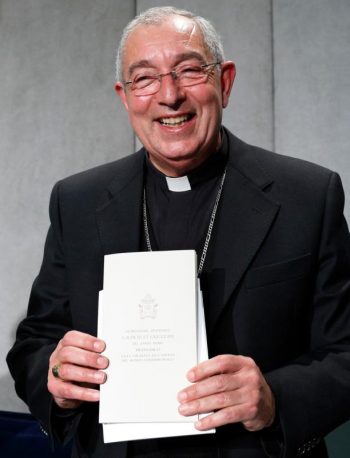
Archbishop Angelo De Donatis, papal vicar for the Diocese of Rome, holds a copy of Pope Francis’ exhortation, “Gaudete et Exsultate” (“Rejoice and Be Glad”), during a news conference on the exhortation at the Vatican April 9. The document is on the “call to holiness in today’s world.” (CNS photo/Paul Haring)
VATICAN CITY (CNS) — Pope Francis’ new document, “Gaudete et Exsultate,” shows that holiness is not an impossible task nor is it something to be pursued far removed from today’s world, said the papal vicar for the Diocese of Rome.
“The pope wants to tell us that holiness is not something else apart from our everyday life, but it is exactly our ordinary existence lived in an extraordinary way,” said Archbishop Angelo De Donatis, the papal vicar.
The archbishop was one of several guests invited to attend a Vatican news conference April 9 for the presentation of Pope Francis’ new apostolic exhortation on the call to holiness in today’s world, titled in English, “Rejoice and Be Glad.”
Many people in today’s secularized world may think holiness is “antiquated,” but the new document seeks to demonstrate its timeless relevance for everyone, the archbishop said.
Pope Francis is reminding Christians that the desired goal of their journey is true life, joy, meaning and fullness found in Jesus with the help of divine grace and the action of the Holy Spirit received in baptism, he said.
“To be Christians means to receive from God the gift of a beautiful life, a life rich in meaning and flavor,” he said.
Officials of the Vatican press office invited individuals from different nations who reside in Rome to offer their impressions of the document.
Deacon Adam Hincks, a Canadian Jesuit continuing his theological studies for the priesthood in Rome, told Catholic News Service that some features of Ignatian spirituality — referring to St. Ignatius, the Jesuit founder — shine through in the document.
[hotblock]
“For example, there’s the idea of being contemplatives in action, which is very Jesuit, finding God in the midst of your daily life, making your daily activity a place of sanctification,” he said, as well as a call to do a “daily examen” to reflect at the end of each day to see “where was God and how did I respond?”
“It’s something that’s very simple that any Christian can do and that really helps you to grow in holiness,” he said.
Hincks, who is an astrophysicist specializing in the history of the universe, said he finds “Gaudete et Exsultate” to be “very inspiring because this isn’t just for people wearing a collar or a habit, it’s for scientists, too, it’s for people who are doing whatever job, anyone can be holy” by doing what they do with love: love for the truth, for God and one’s neighbor.
Sister Josepha, a sister of the Monastic Fraternity of Jerusalem, told CNS that the document seeks to show people holiness is attainable and satisfies that hunger many people, especially young people, feel “to live a relevant life, to give themselves, to improve the world.”
She said the document says, “Go on! You can. You will! Start today with the small things around you. Holiness is not perfection,” but building the kingdom of God with joy and in communion with others.
Mohammad Jawad Haidari, a Muslim and ethnic Hazara who fled from Afghanistan because of violent persecution and discrimination against this minority group, said holiness is common to both Muslims and Christians.
Holiness is “as a path toward God” with saints and prophets acting as signposts indicating the right way for the faithful to go, said Haidari, who earned a master’s degree in religion and cultural mediation while in Rome.
The pope’s document, he said, shows people that the path toward holiness is wide — meant for all people to journey, not just scholars or clerics.
PREVIOUS: St. Grandma? Pope cites the famous and the ‘saint next door’
NEXT: Sweden’s Lutherans to allow Catholic Masses in cathedral



Share this story